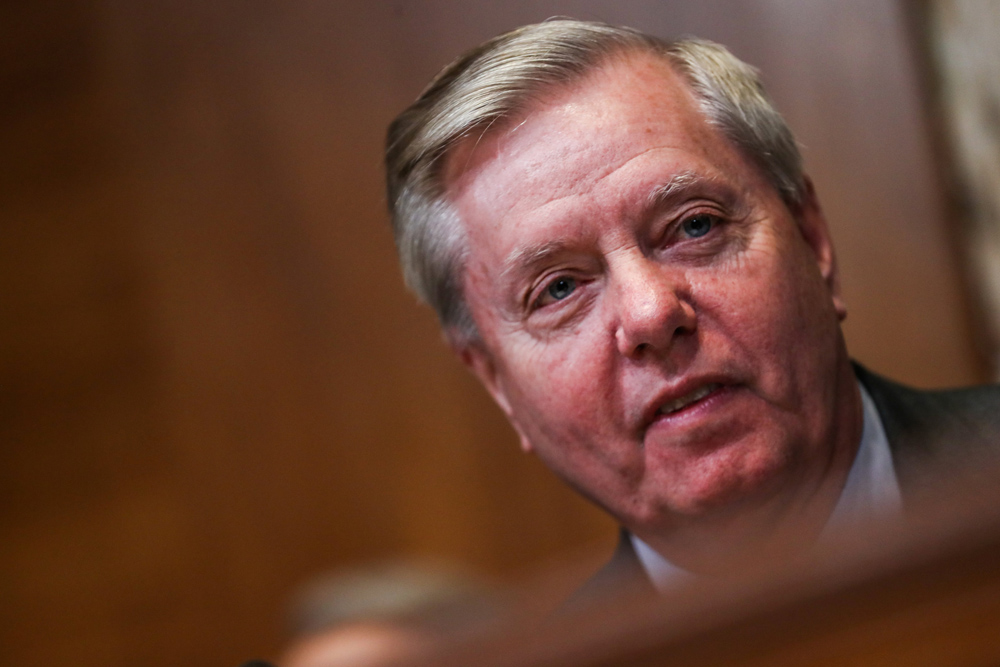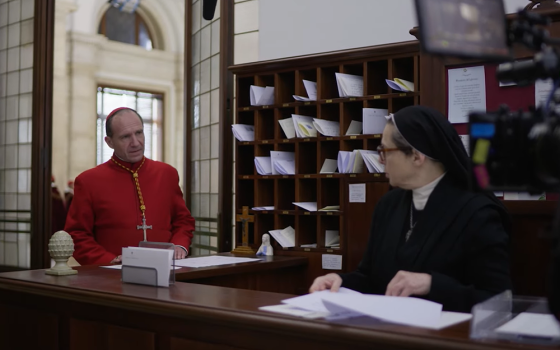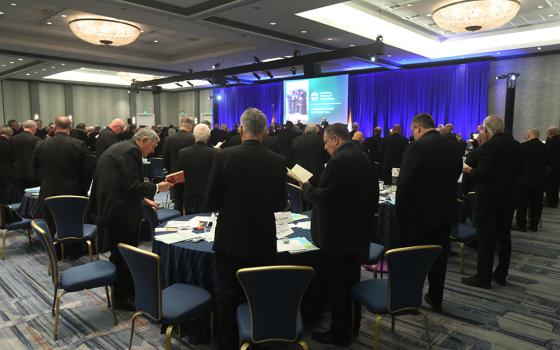
U.S. Sen. Lindsey Graham, R-S.C., is pictured April 9 on Capitol Hill in Washington. (CNS/Jeenah Moon, Reuters)
"Judge not, that ye be not judged." These words, found in the Gospel of St. Matthew, Chapter 7, Verse 1, are a challenge for a columnist, as I found myself discussing with a friend the other day. Judging is an occupational hazard. My interlocutor offered that being judgmental would not keep me from entering the pearly gates if I focused my judgment on ideas, and not people, a commonplace moralism which, like most such commonplaces, is essentially sound. So, I agreed, but then added, "Except for Lindsey Graham."
For years, I held Sen. Graham in high esteem, even though I disagreed with him on many, many issues. Who did not admire his principled position to support the nominations of Sonia Sotomayor and Elena Kagan to the Supreme Court because, however much he disliked their judicial philosophy, they were the president's selection and the Constitution gives the president the right to select justices. Only if the nominees were manifestly unqualified, Graham stated, should a senator vote not to confirm. I think Graham is wrong on this, and that disagreeing with a nominee's judicial philosophy is the best reason to oppose him or her. But, his stance was a principled one at a time when principles were as rare in Washington as an iceberg in Arabia.
Then came Trump.
Emma Dumain at McClatchy compared what Graham had to say about impeachment back in the '90s when he was one of the House managers leading the charge against President Bill Clinton with what he says now. Of all the hypocritical quotes Dumain cites, these words of Graham's defining what constitutes a "high crime" in 1999 are the most damning given his stance today: "Don't cheat in a lawsuit by manipulating the testimony of others. Don't send public officials and friends to tell your lies before a federal grand jury to avoid your legal responsibilities. Don't put your legal and political interests ahead of the rule of law and common decency. If you find that these are high crimes, that is the burden you're placing on the next office holder." Now he repeats the president's lies and tells the president's son, who is not a public official, to ignore a subpoena from Congress.
Mark. Leibovich, writing in The New York Times Magazine in February, catalogued some of the flip-flops and other grotesqueries the senator from South Carolina has indulged in the Trump era, including his outburst against Democrats at the confirmation hearings for Brett Kavanaugh, and his sycophantic praise for the man he once derided as "unfit" for the office of the presidency. "Graham's rush to Trump's side is particularly baffling because not long ago, he was best known for his bipartisan deal-making on issues like climate change and immigration," Leibovich wrote. "He subscribed, at least theoretically, to the country-over-party credo of his departed Senate co-conspirator John McCain." Now, he is craven, reduced to being a Trump cheerleader.
It is impossible, as a columnist or as a voter, to confine one's assessment of Graham to his ideas. Which ideas would you choose? And would you choose them quickly enough before he changes them? After all, if Graham is going to take his cue from the president, and the president's tweets evidence a man who can charitably be described as "unstable," how could a voter form a judgment about whether or not to reelect Graham when he next faces the voters? The problem is not the senator's ideas, but his character.
Graham is not the only Republican senator whose change of position invites comparisons to a Cirque du Soleil contortionist. In 2016 Sen. Mitch McConnell showed his disregard for the Constitution as it had been lived since it was enacted when he refused to even permit a vote on the nomination of Judge Merrick Garland to the Supreme Court. "The American people should have a voice in the selection of their next Supreme Court Justice," said the Senate Majority Leader, explaining that it would be wrong to confirm a new justice during an election year. Unilaterally, McConnell decided the court could do fine with eight justices for more than a year.
This week, asked what he would do should a vacancy on the court arise in the upcoming election year 2020, McConnell said, "Oh, we'd fill it." His smile seemed to suggest he recognized the hypocrisy, and so far from being ashamed by it, he reveled in his Machiavellian disdain for the traditions of American democracy, in his lack of any sense of fair play, in the rawness of his willingness to use the enormous power his office holds. N.B. The office of majority leader is not mentioned in the Constitution for you originalists out there. The provisions for impeachment, the emoluments' clause, and some fine words about the general welfare, are included in that founding document. Hypocrisy heaped on hypocrisy.
Advertisement
In "Forming Consciences for Faithful Citizenship," the U.S. bishops' document on the moral responsibilities of voting, there is very little on character. They state: "These decisions [voting] should take into account a candidate's commitments, character, integrity, and ability to influence a given issue. In the end, this is a decision to be made by each Catholic guided by a conscience formed by Catholic moral teaching." The bishops decided last year they would not rewrite the document for this election cycle, a decision I deeply regret because the core text does not reflect the magisterium of either Pope Francis or Pope Benedict. They decided, instead, they would simply add supplemental material to the text, produce a brochure, and make a video. I hope they will expand upon the need to consider character in determining for whom to vote in these new supplemental materials.
When you look at the viral cowardice on Capitol Hill, the standards for character cannot be too high. But, we should be plain about the danger here. Pope Francis is correct that ideology can distort our politics and our moral bearings. Yet, a commitment to a person that causes one to abandon any commitment to ideas, to intellectual and moral consistency, to the traditions of our democracy, this poses an even greater danger. It opens the door to a politics that is not built on commitment to the demos or to the Constitution, but on a commitment to the leader. The word in English sounds so benign, even noble: Who does not like a leader? But, in this case, I think the Spanish or Italian words for leader better convey the danger: caudillo or duce. We are learning a disturbing lesson about how thin the line can be between a democratic leader and an authoritarian bully. Appeals to nationalism, subverting democratic norms, undermining the free press, co-opting powerful politicians and business interests, serial deceit and misinformation, putting legitimate powers to corrupt uses, politicizing the police and the military, we have seen this before. Only a principled commitment to the Constitution, the rule of law and democratic norms can save us from the putative tyrant in the White House.
[Michael Sean Winters covers the nexus of religion and politics for NCR.]
Editor's note: Don't miss out on Michael Sean Winters' latest: Sign up and we'll let you know when he publishes new Distinctly Catholic columns.








